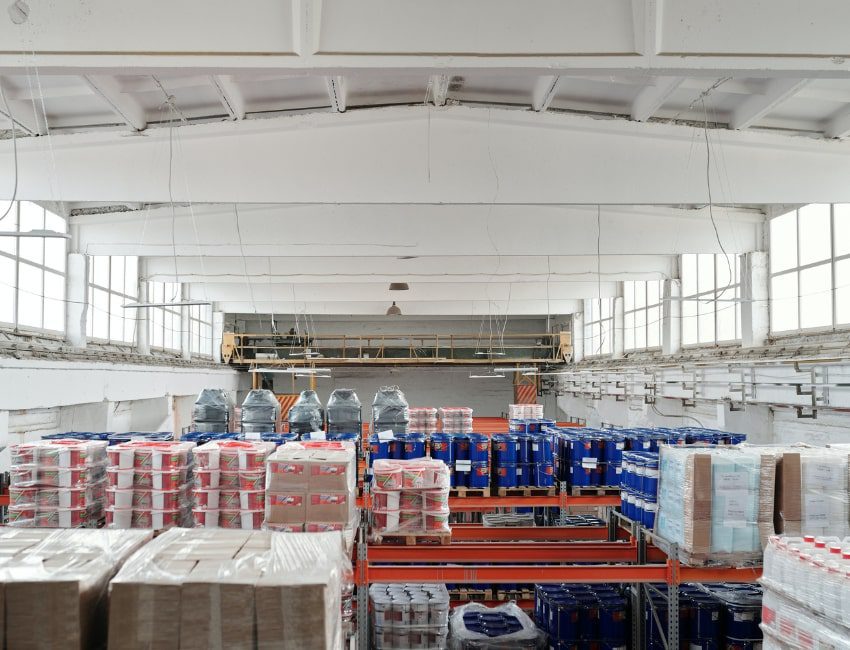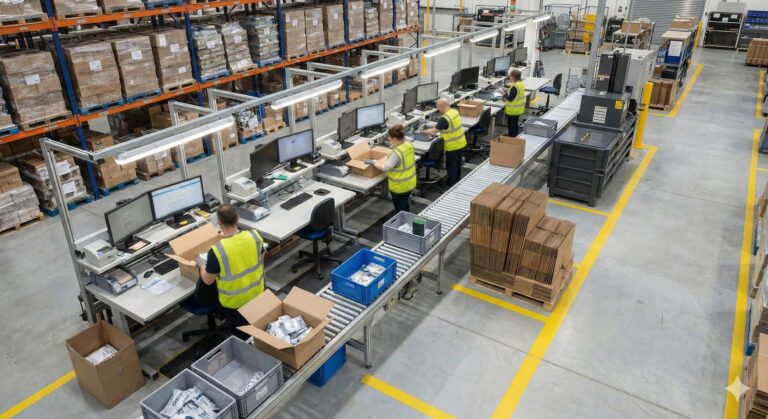In today’s competitive business landscape, efficiency is the name of the game. As companies strive to meet the increasing demands of customers while maximizing profitability, the importance of optimizing warehouse operations cannot be overstated.
However, the complexities and resource requirements associated with managing warehouse operations internally often pose significant challenges for businesses. It is in response to these challenges that the practice of outsourcing warehouse operations has gained considerable traction.
Outsourcing operations is on the rise
According to a recent study by Grand View Research, the global business process outsourcing market is expected to reach $525 billion by 2030 (Grand View Research Inc). The rising trend of outsourcing warehouse operations can be attributed to several factors. First and foremost, outsourcing provides businesses with access to specialized expertise and resources. Third-party logistics providers, like Hanzo Logistics, have extensive knowledge and experience in managing complex warehousing and distribution tasks. They employ industry best practices, cutting-edge technology, and highly trained staff to optimize operations and ensure seamless execution. Outsourcing also allows businesses to focus on their core competencies and strategic initiatives while entrusting the complexities of warehouse management to experts, resulting in increased agility and competitiveness.
Benefits of Outsourcing Warehouse Operations
Outsourcing warehouse operations offers businesses a range of compelling benefits, from cost savings to specialized expertise and technology. By leveraging the capabilities of a trusted third-party logistics provider like Hanzo Logistics, businesses can unlock the full potential of their supply chain.

Cost savings and reduced overhead expenses
Significant cost savings and reduced overhead expenses are one of the great benefits of outsourcing warehouse operations. In fact, according to a 2020 survey by Deloitte, the number one reason for outsourcing for 70% of companies is cost reduction (Deloitte). By partnering with a third-party logistics provider, companies can avoid upfront investments in infrastructure, equipment, and technology for efficient warehouse management. The logistics provider assumes responsibility for capital expenditures, maintenance, and upgrades, alleviating the financial burden on the business. Moreover, outsourcing allows for better cost control through scalable solutions, as companies can adjust their warehousing needs based on demand fluctuations, thereby eliminating the costs associated with underutilized or excess warehouse space. Additionally, outsourcing reduces labor costs as the logistics provider handles staffing, training, and managing workforce requirements, optimizing productivity and minimizing recruitment and employee benefits expenses.
Enhanced operational efficiency and scalability
Outsourcing warehouse operations enhances operational efficiency and scalability. Third-party logistics providers are experienced in warehouse management and employ industry best practices to optimize processes and workflows. They utilize advanced technologies, such as warehouse management systems (WMS), inventory tracking, and automated order fulfillment, to streamline operations, reduce errors, and improve productivity. Additionally, logistics providers possess the flexibility and scalability to accommodate fluctuations in business demands, such as seasonal peaks or sudden growth, ensuring that companies can meet customer requirements without disruptions. This scalability allows businesses to avoid the risks of overcapacity or bottlenecks, providing a seamless and efficient supply chain.
Access to specialized expertise and technology
Companies have access to specialized expertise and advanced technology that may otherwise be costly or challenging to acquire internally when outsourcing operations. Third-party logistics providers possess extensive knowledge and experience in warehouse management, leveraging their expertise to optimize processes, implement efficient layouts, and deploy innovative inventory control and order fulfillment strategies. They stay up-to-date with the latest industry trends and advancements, enabling businesses to benefit from cutting-edge technologies and automation solutions. By tapping into this specialized expertise and technology, companies can improve their overall warehouse performance, increase accuracy, reduce cycle times, and enhance customer satisfaction.
Risk mitigation and improved regulatory compliance
Businesses that outsource warehouse operations can significantly reduce risk and improve regulatory compliance. Logistics providers are well-versed in industry regulations, safety standards, and compliance requirements, ensuring warehouse operations adhere to legal and regulatory frameworks. They implement robust security measures, including surveillance systems, access controls, and stringent inventory tracking, minimizing the risk of product theft, loss, or damage. Furthermore, logistics providers have contingency plans and disaster recovery procedures in place, safeguarding businesses from unforeseen events such as natural disasters or disruptions in the supply chain. By partnering with a reliable logistics provider, companies can mitigate risks, enhance operational resilience, and ensure compliance with industry standards.
Focus on core business functions and strategic growth
One of the key benefits of outsourcing warehouse operations is the ability for companies to refocus their resources and attention on core business functions and strategic growth initiatives. By entrusting warehouse management to a specialized partner, businesses can free up valuable time, personnel, and capital that can be redirected toward activities that directly impact their competitive advantage and revenue generation. Whether developing new products, expanding into new markets, or improving customer service, outsourcing allows businesses to allocate their resources strategically. This increased focus on core functions and growth-oriented activities enables companies to stay agile, responsive, and ahead of the competition, fostering long-term success and profitability.
Understanding Warehouse Operations
By understanding the critical components of warehouse operations, recognizing the challenges involved, and implementing strategic planning and organizational strategies, businesses can optimize their warehouse processes, improve operational efficiency, and meet customer demands effectively.

The key components of warehouse operations
Warehouse operations encompass a range of interconnected activities that are essential for the efficient management of inventory, order fulfillment, and overall logistics processes. The key components of warehouse operations include:
Receiving: This involves the inspection, verification, and acceptance of incoming goods or shipments. It includes processes such as unloading, checking for damages or discrepancies, and recording inventory.
Storage and Inventory Management: Once received, goods are organized, labeled, and stored in designated locations within the warehouse. Efficient inventory management practices, such as real-time tracking, proper rotation, and optimization of storage space, play a crucial role in minimizing errors, stockouts, and inventory holding costs.
Order Fulfillment: This process involves picking, packing, and shipping products based on customer orders. It requires accurate inventory management, efficient order processing systems, and effective coordination between different teams within the warehouse.
Packaging and Labeling: Proper packaging and labeling of products ensure safe transportation, accurate identification, and compliance with regulatory requirements. This includes selecting appropriate packaging materials, labeling products with barcodes or RFID tags, and ensuring proper documentation.
Shipping and Transportation: Warehouse operations also involve coordinating outbound shipments, selecting carriers, arranging transportation, and ensuring timely and accurate delivery to customers or distribution centers. This requires effective logistics management, tracking systems, and adherence to shipping regulations.
Challenges faced in managing warehouse operations
Managing warehouse operations internally can present various challenges for businesses, including:
Space Optimization: Limited warehouse space and increasing inventory levels can make it challenging to organize products efficiently, leading to congestion, inefficiencies, and difficulty locating items.
Labor Management: Hiring, training, and managing a skilled workforce can be demanding and time-consuming. Adequate staffing levels, employee retention, and a productive work environment are critical for seamless warehouse operations.
Inventory Accuracy: Maintaining accurate inventory records is crucial for preventing stockouts, minimizing excess stock, and ensuring efficient order fulfillment. However, manual tracking systems, data entry errors, and inaccurate documentation can result in inventory discrepancies and operational disruptions.
Technology Integration: Implementing and integrating warehouse management systems (WMS), barcode scanning, and other technological solutions can be complex and require careful planning and training to ensure seamless operations and data accuracy.
Need for strategic planning and organization
To effectively manage warehouse operations, strategic planning and organization are vital. Third-party logistics partners like Hanzo can provide the expertise to streamline every aspect of warehousing operations. A comprehensive warehousing strategy includes:
Layout and Space: Designing an efficient warehouse layout optimizes space utilization, streamlines workflow, and minimizes travel distances. Proper zoning, product placement, and implementing lean principles can enhance operational efficiency.
Process Standardization: Developing standardized operating procedures for various warehouse activities promotes consistency, accuracy, and productivity. Clearly defined processes for receiving, storage, order fulfillment, and shipping help reduce errors and ensure efficient operations.
Performance Metrics and Continuous Improvement: Establishing key performance indicators (KPIs) and regularly monitoring metrics such as order accuracy, on-time delivery, and inventory turnover enables businesses to identify areas for improvement and drive operational excellence. Implementing continuous improvement initiatives, such as Lean or Six Sigma, helps streamline processes and eliminate waste.
Training and Development: Providing ongoing training and development programs for warehouse staff ensures they have the necessary skills, knowledge, and understanding of best practices to perform their tasks effectively. This includes training on safety protocols, equipment operation, and the use of warehouse management systems.
Partnering with Hanzo
Partnering with Hanzo Logistics means benefiting from our warehousing expertise, accessing tailored solutions and cutting-edge technology. It’s our mission to empower you to focus on your core business functions and strategic growth while we handle the intricacies of warehouse operations.

Expertise in optimizing warehouse operations
At Hanzo Logistics, we bring a wealth of expertise and experience in optimizing warehouse operations. Our dedicated team of logistics professionals understands the intricacies and challenges of managing a highly efficient warehouse. With years of industry knowledge, we have developed best practices and strategies to enhance inventory management, streamline order fulfillment, and improve overall operational efficiency. We stay up-to-date with the latest trends and advancements in warehouse management, ensuring that our clients benefit from the most effective solutions and practices in the industry.
Tailored solutions and comprehensive services
We understand that every business is unique and has specific requirements when it comes to warehouse operations. That’s why we offer tailored solutions and comprehensive services to meet the individual needs of our clients. Whether you require end-to-end warehouse management or specific services such as receiving, inventory management, order fulfillment, or shipping, we can customize our offerings to align with your business goals. Our flexible approach allows us to scale our services based on your evolving needs, whether you are a small business experiencing growth or a large enterprise seeking to optimize your supply chain.
Cutting-edge technology and infrastructure
We leverage cutting-edge technology and infrastructure to deliver superior warehouse operations. Our state-of-the-art warehouse facilities are equipped with advanced systems, including warehouse management systems (WMS), inventory tracking, and real-time reporting capabilities. These technologies enable us to track inventory accurately, optimize storage space, and ensure seamless order processing and fulfillment. We invest in the latest industry-leading tools and technologies to provide our clients with efficient and transparent warehouse management solutions.
Furthermore, our robust infrastructure includes modern material handling equipment, ensuring the smooth and safe movement of goods within the warehouse. We prioritize security measures, implementing advanced surveillance systems and access controls to protect your valuable inventory. By leveraging our technology and infrastructure, you can gain a competitive edge, improve visibility into your supply chain, and drive operational excellence.
Embracing the Power of Outsourcing Warehouse Operations

In today’s dynamic and competitive business environment, efficient warehouse operations have become a vital component of driving business success. The complexities and challenges in managing warehouse operations internally have led businesses to recognize the immense value of outsourcing.
By outsourcing warehouse operations, businesses can unlock a plethora of advantages. They can experience cost savings, reduced overhead expenses, and enhanced operational efficiency. The access to specialized expertise and advanced technology offered by third-party logistics providers allows companies to stay ahead of the curve and deliver exceptional customer experiences. Moreover, outsourcing mitigates risks, ensures regulatory compliance, and allows businesses to redirect their focus toward core business functions and strategic growth.
As a trusted third-party logistics company, we offer a compelling solution for businesses seeking to optimize their warehouse operations. With cutting-edge technology and years of expertise at our disposal, we deliver the tools and capabilities required to thrive in today’s rapidly evolving business landscape.



